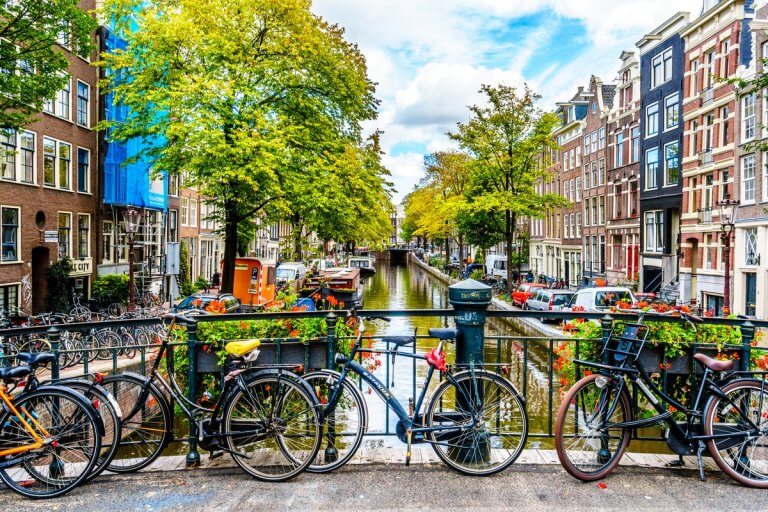
Home to more than 17 million people who form one of the world’s happiest nations, it’s no surprise that learners love to study in the Netherlands.
Last year, a total 122,000 international students were enrolled across the country, all of whom were seeking a rewarding education in a global study hub. But this European region offers so much more than leading universities, windmill-dotted countryside and quaint canal-filled cities. The Netherlands is a country forged on rich history and culture, complemented by a vibrant, inclusive and affordable student lifestyle.
Sounds good, right? You’d better start thinking about submitting your application…
Do I need a student visa for the Netherlands?
According to the official website for studying in the Netherlands, your eligibility for a visa depends on:
- Your nationality – as stated on your passport
- The duration of your stay: shorter or longer than three months
- Your purpose of stay: Which assumes that you’re travelling to Holland for study or to pursue a preparatory year – for any other purpose of stay, please check the website of the Dutch Immigration and Naturalization Service (IND) to find out the requirements
The Dutch government makes it easy on foreigners by only distinguishing between short- and long-term visitors. If you’re studying in the Netherlands for a period shorter than 90-days or three-months, you’ll likely be encouraged to apply for a “schengen” or “short-term” visa. For students in the Netherlands on a semester or year long study abroad programme, you’ll need to apply for a visa as outlined below.
Check out how many Nigerians can get scholarships to study in the Netherlands each year!https://t.co/DposLFROKF pic.twitter.com/8m9zZ4kswI
— Naij.com (@naijcom) February 24, 2016
MVV Provisional Residence Permit vs. VVR Residence Permit
An entry visa (MVV in Dutch) is a passport sticker issued by the Dutch Embassy or Consulate in your home country (or the home of your legal residence), and a residence permit (VVR in Dutch) is an I.D. card that allows you to legally reside in the Netherlands.
You will need both the MVV and the VVR as an international student in the Netherlands, provided your study abroad programme is longer than 90-days in length. It’s recommended that students apply for the MVV as early as possible, at least two-months in advance.
You will enter the Netherlands on your MVV and then will need to coordinate with your host institution the transition to the VVR. The university will normally apply for the VVR on your behalf, and will provide support for this changeover after your arrival. It normally takes two weeks to process the second half of your visa, and students can pick up their newly-minted passports from the local IND near their Dutch study abroad city.
It’s worth noting that universities will charge for the service they provide when applying for your VRR, but the actual cost varies from institution to institution. Check in with your Dutch academic advisor to ensure you’re on the right track and have the necessary funds to cover costs.
What are the application requirements?
Many universities will take care of your student visa and residence permit application on your behalf – be sure to check in with your host institution to clarify procedures. This logistical help might be an added service, or lumped into your overall programme costs.
All visa applications will require the following:
- Admittance into a full-time university programme
- Demonstration of sufficient funds to cover your living expenses
- A valid passport
Looks like Vienna and feels like NY, but this is the coolest city to study in the Netherlands: #TheHague. #Erasmus pic.twitter.com/YqSU5UqAyR
— Uniplaces (@Uniplaces) February 2, 2016
The Application Procedure
Once you submit your visa and/or residence permit application to the Dutch Immigration Department (IND), you’ll need to wait four to six weeks for it to be processed. Following this, you’ll need to collect your official visa from a Dutch embassy or consulate. Student residency permits are granted for three months beyond the duration of your study programme. Can anyone smell a vacation?!
Can I leave the Netherlands on my student visa?
Yup! You can visit any other countries under the “schengen visa” for less than 90-days while on your Netherlands residence permit. We suggest saving your three-month holiday until AFTER finals!
An additional step to ensure you’re legally residing in the Netherlands as a student is to register in the national database. Registering allows you to open a local bank account, or eventually apply for a work permit (you go-getter, you!). If you’re intending to stay in the Netherlands for longer than four-months, you’re required by law to register.
So there you have it. Student visa in tow, you can now officially join the strong, global community of international students in Holland!







